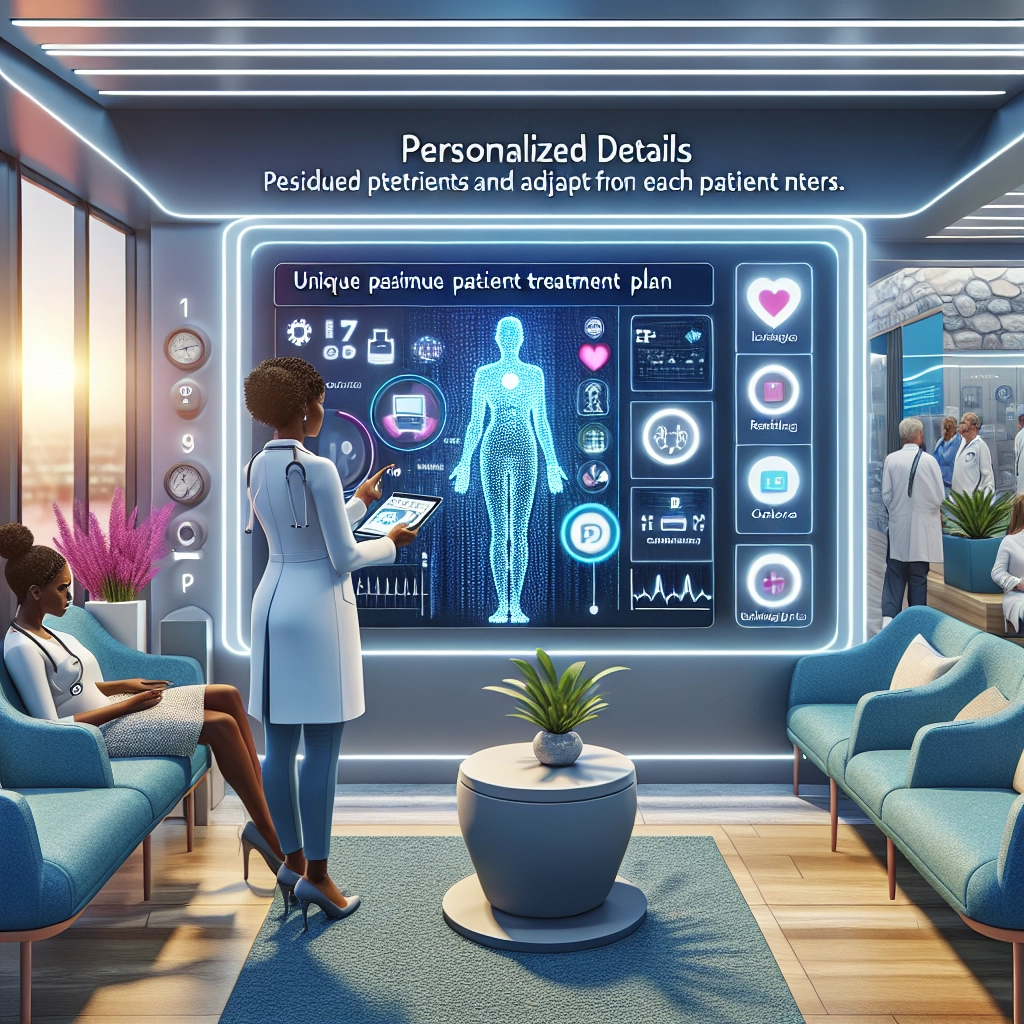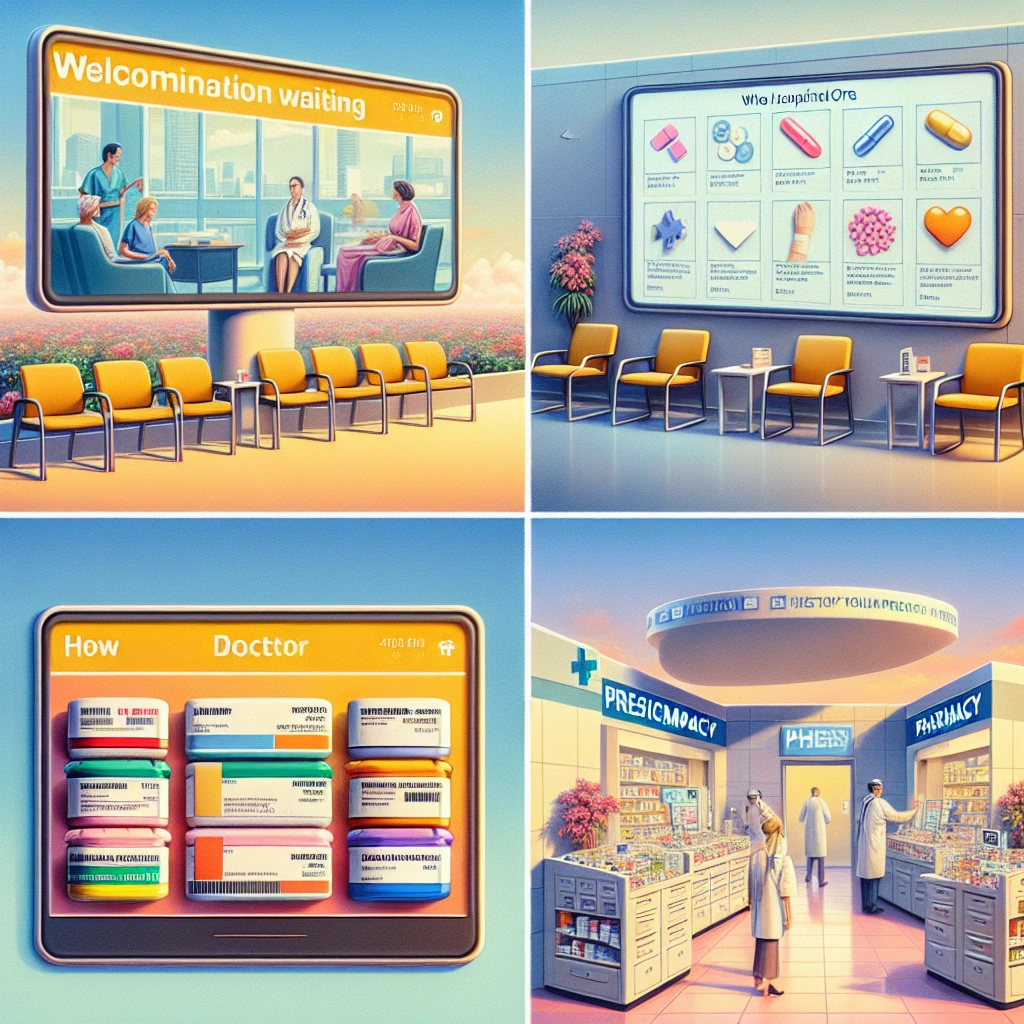

Personalization in healthcare marketing refers to the practice of tailoring marketing efforts to meet the unique needs and preferences of individual patients. It involves using data-driven insights to deliver personalized experiences that can build stronger relationships with patients, increase satisfaction, and improve patient loyalty.
Personalization in healthcare marketing is of utmost importance as it helps providers to engage healthcare consumers in a highly personalized way. By customizing messaging and resources to the right channels, healthcare organizations can ensure higher engagement, better returns on investment, and ultimately improve the patient experience.
Additionally, with the increasing consumerization of healthcare, personalized patient engagement strategies have become essential for healthcare providers to meet the evolving expectations of their patients.
Check out this Youtube video: “Personalization in Healthcare Marketing” to learn how personalized marketing strategies can improve patient engagement and overall healthcare outcomes.
Understanding the Target Audience
Identifying the specific demographics of the target audience
To identify the specific demographics of the target audience in healthcare marketing, we need to consider factors such as age, gender, income, location, and interests. Conducting thorough market research using tools like Google Analytics, surveys, and focus groups can provide insights into the preferences, needs, and online behaviors of the audience.
For instance, analyzing age groups and gender distribution can help tailor marketing strategies to effectively reach different segments of the audience. Moreover, understanding the geographic location and income levels can influence the customization of healthcare services and marketing efforts.
Understanding the unique needs and preferences of the target audience
Understanding the unique needs and preferences of the target audience involves recognizing their lifestyle, values, and buying behaviors. It’s essential to craft a value proposition that resonates with the specific healthcare needs of the audience.
For instance, engaging in market research methods like focus groups, surveys, social media listening, and interviews can provide valuable insights. By analyzing qualitative research data, companies can understand public opinion and align healthcare marketing efforts to cater to the unique needs and preferences of the audience.
Seeking to understand the unique appeal of healthcare services can significantly impact the marketing strategies and the delivery of personalized healthcare experiences based on the audience’s preferences.
| Age Group | Gender Distribution | Geographic Location | Income Levels |
|---|---|---|---|
| 18-30 | 55% Female, 45% Male | Urban & Suburban | High Income |
| 30-45 | 60% Female, 40% Male | Suburban & Rural | Middle Income |
The above table is an example of how specific demographics, consisting of age groups, gender distribution, geographic location, and income levels, are vital in targeting the audience for personalized healthcare marketing. Understanding these demographics fosters a more tailored approach to healthcare marketing strategies and services delivery.
Data Collection and Analysis
Utilizing data analytics to gather insights on patient behavior:
Data analytics plays a crucial role in understanding patient behavior within the healthcare sector. By leveraging advanced analytics tools, healthcare providers can delve into patient demographics, trends in treatment approaches, and medication adherence patterns.
Through this, they can identify specific health concerns affecting different demographics, thereby tailoring personalized healthcare marketing strategies to target those specific needs. For instance, analyzing patient behavior data may reveal that a certain demographic has a higher tendency to miss medical appointments, prompting targeted campaigns to increase appointment adherence within that specific group.
Leveraging electronic health records for personalized marketing strategies:
Electronic Health Records (EHR) provide a goldmine of valuable information that can be leveraged for personalized healthcare marketing strategies. By harnessing data from EHR, healthcare providers can tailor marketing campaigns to individual patients based on their medical history, previous treatments, and ongoing health concerns.
For example, a hospital may utilize EHR data to create personalized email campaigns promoting specific health screenings for patients with a history of a particular condition, enhancing the relevance and effectiveness of the marketing strategy. Additionally, EHR data analysis can identify opportunities for preventive care initiatives, ensuring that marketing efforts focus on proactive health management, thus enhancing patient engagement and satisfaction.
| Pros of Utilizing Data Analytics for Patient Behavior Insights | Cons of Utilizing Data Analytics for Patient Behavior Insights |
|---|---|
| – Enhanced understanding of patient demographics and behavior trends | – Potential privacy concerns and data security risks |
| – Tailoring marketing strategies to specific health concerns and demographics | – Challenges in collecting and analyzing diverse data sources |
| – Improved patient engagement through targeted campaigns | – The need for specialized data analytics skills among healthcare professionals |
The integration of data analytics and electronic health records is revolutionizing healthcare marketing by enabling truly personalized and targeted strategies to improve patient care and engagement. This approach not only benefits healthcare providers but also enhances the overall patient experience, leading to better health outcomes.
Personalizing Communication Strategies
Tailoring the messaging to resonate with individual patients
Tailoring the messaging to resonate with individual patients is crucial in healthcare marketing. For instance, rather than sending generic emails about overall health tips, crafting personalized messages that address specific health concerns of individual patients can significantly enhance engagement. By acknowledging their unique health needs and providing tailored solutions, healthcare providers can build a more personal and trustworthy relationship with their patients.
Implementing personalized email marketing campaigns
Implementing personalized email marketing campaigns allows healthcare providers to directly engage with their patients. For example, sending personalized appointment reminders, pertinent health tips, and information about specific services based on patients’ medical history and preferences can lead to higher open rates and better response. This targeted approach can create a sense of individual care and attention, fostering stronger patient-provider relationships and ultimately improving patient outcomes.
Customizing Patient Experience
Enhancing patient engagement through personalized portals requires a seamless patient experience. By creating personalized patient portals, healthcare providers can cater to individual patient needs and preferences, leading to improved engagement and satisfaction.
Furthermore, it allows patients to access their health information conveniently, fostering a sense of empowerment and involvement in their own care. Additionally, personalizing the patient journey from appointment scheduling to follow-up care involves tailoring communication and interactions to meet the specific needs and preferences of each patient.
This personalized approach can contribute to higher patient satisfaction and better health outcomes.
Customization of patient experience in healthcare marketing through personalized patient portals and personalized patient journeys plays a crucial role in fostering patient engagement and satisfaction. It empowers patients to take an active role in their healthcare journey and ensures that their specific needs and preferences are met at every stage of their interaction with healthcare providers.
Technology Integration
Implementing AI and machine learning for personalized recommendations
AI and machine learning are revolutionizing personalized healthcare recommendations. By leveraging machine learning algorithms, healthcare providers can analyze vast amounts of patient data to understand individual health patterns and preferences.
For instance, AI can predict a patient’s likelihood of developing a certain condition based on their unique genetic makeup and lifestyle choices, allowing for highly personalized preventive care recommendations. In fact, companies like Google DeepMind have already made significant strides in developing AI models that can support multiple modalities within a single system, laying the groundwork for hyper-personalized healthcare solutions.
Leveraging telemedicine for personalized virtual care options
Telemedicine offers unprecedented opportunities for personalized virtual care. By incorporating digital health monitoring capabilities, combined with artificial intelligence and machine learning, telemedicine systems can deliver accurate and tailored virtual care options.
This means that patients can receive individualized care and treatment plans without the need for physical appointments. For instance, using health apps for scheduled follow-up visits results in more effective interactions between doctors and patients, ultimately optimizing patient outcomes and reducing missed appointments.
This transformation in virtual care represents a significant step towards personalized healthcare experiences for all.
| AI and Machine Learning | Telemedicine |
|---|---|
| Predictive healthcare recommendations | Tailored virtual care options |
| Analysis of patient data for personalized care | Reduced need for physical appointments |
| Google DeepMind’s multimodal AI approach | Effective follow-up visits using health apps |
Compliance and Ethical Considerations
Ensuring compliance with HIPAA regulations in personalized marketing efforts
HIPAA regulations must be strictly adhered to in personalized marketing efforts within the healthcare industry. Any marketing strategies involving patient data must comply with the strict guidelines set forth by HIPAA to ensure the privacy and security of patients’ protected health information.
For instance, any personalized marketing communications must obtain explicit consent from patients before using their data for marketing purposes.
Addressing ethical concerns related to personalized healthcare marketing
Personalized healthcare marketing raises ethical considerations regarding privacy, discrimination, and data collection. Organizations must ensure that the use of personal data for marketing purposes is done ethically and does not result in discrimination or privacy violations.
For example, healthcare marketers should be cautious when using sensitive data such as race, gender, or health status to avoid potential biases or privacy breaches. Furthermore, adherence to ethical codes of the medical profession is crucial to maintain integrity and respect for patients’ privacy in healthcare marketing practices.
| HIPAA Compliance | Ethical Considerations |
|---|---|
| Explicit patient consent required for data usage in marketing | Caution in using sensitive data for personalized marketing |
| Strict adherence to HIPAA guidelines for data privacy | Compliance with ethical codes of the medical profession |
| Verification of patient authorization for marketing communications | Prevention of discrimination or privacy breaches in marketing efforts |
Remember, it’s crucial to strike the right balance between personalized marketing and ethical considerations to ensure patient privacy and maintain the integrity of healthcare marketing practices.
Measuring Success
Establishing key performance indicators for personalized marketing initiatives can be a game-changer in understanding the effectiveness of your healthcare marketing strategies. By setting KPIs tailored to your personalized initiatives, you can track metrics such as patient engagement, conversion rates, and customer acquisition costs.
For example, tracking the click-through rates on personalized email campaigns or monitoring the patient feedback from targeted messaging can provide valuable insights into the success of your personalized marketing efforts.
Analyzing the impact of personalization on patient engagement and retention is crucial for assessing the effectiveness of your marketing strategies. By leveraging personalized content and targeted messaging, healthcare providers can enhance patient engagement, resulting in improved satisfaction and retention rates.
For instance, analyzing retention length between groups exposed to personalized messages and those who weren’t can provide concrete data on the impact of personalization on patient retention.
| KPIs for Personalized Marketing Initiatives | Impact of Personalization on Patient Engagement and Retention |
|---|---|
| Customer acquisition cost (CAC) | Retention Length Between Groups |
| Patient feedback | Patient Engagement and Satisfaction |
| Click-through rates | Effect of Personalized Messaging on Retention Rates |
Personalization in Pharmaceutical Marketing
Tailoring marketing efforts to healthcare providers for personalized drug detailing involves customizing promotional strategies to meet the specific needs and preferences of healthcare professionals. This can be achieved through targeted messaging, tailored educational materials, and personalized interactions with representatives.
By understanding the individual requirements of healthcare providers, pharmaceutical companies can deliver more relevant and impactful information about their products, ultimately enhancing engagement and fostering stronger relationships.
Utilizing personalized digital ads for pharmaceutical products is an effective way to reach healthcare providers and engage them with relevant content. This approach involves leveraging data-driven insights to deliver personalized advertisements that resonate with the specific interests and needs of healthcare professionals.
By tailoring digital ad campaigns to target healthcare providers based on their specialties, geographic locations, and professional interests, pharmaceutical companies can maximize the impact of their marketing efforts and drive meaningful engagement with their products.
| Personalization in Pharmaceutical Marketing |
|---|
| Tailoring Marketing Efforts to Healthcare Providers for Personalized Drug Detailing |
| Utilizing Personalized Digital Ads for Pharmaceutical Products |
Case Studies and Best Practices
Highlighting successful implementations of personalized marketing in healthcare
One successful implementation of personalized marketing in healthcare is the use of targeted emails to promote relevant health screenings based on individual patient profiles. For example, a healthcare organization may analyze patient data to identify individuals at risk for certain diseases and send personalized reminders for screenings, leading to increased patient engagement and improved health outcomes.
Another successful practice is the use of personalized content marketing, such as blogs and case studies, to educate patients about specific treatment options or disease management programs tailored to their unique needs. This personalized approach fosters a deeper connection between patients and healthcare organizations, leading to better patient satisfaction and loyalty.
Showcasing best practices from leading healthcare organizations
Leading healthcare organizations have excelled in personalizing their marketing efforts by leveraging market segmentation for advertising and developing stronger customer personas. By tailoring advertising and content to specific patient groups, these organizations have seen improved patient engagement and response rates, ultimately leading to better healthcare outcomes.
Moreover, effective implementation of an omnichannel strategy, including personalized appointment reminders and targeted communications, has been a best practice adopted by leading healthcare organizations. This approach ensures that patients receive relevant, timely, and personalized information, resulting in increased patient satisfaction and improved health management.
| Strategy | Impact |
|---|---|
| Targeted emails for health screenings | Increased patient engagement and improved health outcomes |
| Personalized content marketing | Deeper patient connection, better satisfaction, and loyalty |
| Market segmentation and customer personas | Improved patient engagement and response rates |
| Omnichannel strategy with personalized comms | Better patient satisfaction and improved health management |
Overcoming Challenges
Addressing the potential challenges and barriers in implementing personalized marketing
Implementing personalized marketing in healthcare faces potential challenges and barriers, including privacy concerns and the risk of data breaches. Businesses must carefully collect and use customer data in an ethical and responsible manner to address these concerns.
Strategies for overcoming resistance to personalized healthcare marketing efforts
To overcome resistance to personalized healthcare marketing efforts, it is essential to invest in advanced technology, resources, and time. Marketers should focus on creating useful and engaging content optimized for search, using advanced strategies such as artificial intelligence, virtual assistants, and retargeting ad campaigns to stay competitive.
Future Trends in Personalization
Exploring emerging technologies and trends in personalized healthcare marketing
The future of personalized healthcare marketing is closely intertwined with emerging technologies, including artificial intelligence (AI), big data analytics, virtual and augmented reality (VR/AR), and wearable tech. These advancements enable healthcare marketers to craft personalized messages and content tailored to the specific needs of individual patients, thereby enhancing the overall patient experience and improving health outcomes.
Predicting the future impact of personalization on the healthcare industry
In the coming years, personalization will continue to revolutionize the healthcare industry by leveraging an abundance of quality data and connected tools. This approach will empower healthcare providers to deliver tailored treatment plans and care, ultimately leading to improved patient satisfaction and better health outcomes.
As personalized marketing becomes more prevalent, it is expected to build trust and credibility among patients, thereby enhancing the overall healthcare experience and driving positive patient engagement.
The Impact of Personalization on Patient Outcomes
Discussing the correlation between personalized marketing and patient health outcomes
Personalized marketing in healthcare has a direct correlation with patient health outcomes. By tailoring healthcare messaging and services to individual patient needs and preferences, healthcare providers can effectively address specific health concerns, leading to improved treatment adherence and overall health management.
For example, leveraging personalized marketing to remind diabetic patients about the importance of regular blood sugar monitoring and medication adherence has shown significant improvements in their long-term health outcomes.
Exploring how personalization can contribute to improved patient satisfaction and loyalty
The implementation of personalized marketing in healthcare plays a pivotal role in enhancing patient satisfaction and fostering long-term loyalty. Through personalization, healthcare providers can demonstrate a deep understanding of each patient’s unique needs and concerns, leading to a higher level of patient satisfaction.
Moreover, when patients feel genuinely understood and cared for by their healthcare providers, they are more likely to develop a sense of loyalty and trust, leading to improved patient retention and long-term engagement with healthcare services. For instance, offering personalized wellness plans and tailored health education content has been proven to increase patient satisfaction and loyalty, ultimately leading to better health outcomes.
| Key Benefits of Personalized Marketing in Healthcare |
|---|
| Increased treatment adherence and health management |
| Enhanced patient satisfaction and loyalty |
| Improved patient retention and long-term engagement |
Building Trust through Personalization
Establishing trust with patients through personalized healthcare marketing efforts
Personalized healthcare marketing efforts play a crucial role in establishing trust with patients. By tailoring marketing messages and communications to address specific patient needs, concerns, and preferences, healthcare providers can demonstrate a deep understanding of their patients.
For example, utilizing patient data to personalize outreach messages and offers can create a sense of being truly understood, thus fostering trust and connection.
Fostering long-term relationships with patients through personalized communication
In addition to building trust, personalized communication also contributes to fostering long-term relationships with patients. By regularly engaging patients with tailored and relevant content, healthcare providers can create a stronger bond and sense of loyalty.
For instance, offering personalized health tips, appointment reminders, and follow-up care instructions demonstrates a commitment to the individual patient’s well-being, leading to heightened patient satisfaction and retention.
| Personalization Tactics | Impact |
|---|---|
| Tailored outreach messages | Deep understanding |
| Personalized health tips | Heightened patient satisfaction |
| Appointment reminders | Stronger bond and loyalty |
By leveraging personalized healthcare marketing efforts and communication, healthcare providers can solidify trust, build lasting relationships, and position themselves as partners in their patients’ health journey.
Legal and Regulatory Considerations
Navigating the legal implications of personalized marketing in healthcare
Patients’ privacy and data protection are of utmost importance when utilizing personalized marketing in healthcare. Navigating the legal implications involves ensuring full compliance with HIPAA, GDPR, and other relevant regulations.
For example, healthcare providers must obtain explicit consent from patients before using their personal data for marketing purposes.
Addressing consumer privacy concerns in personalized healthcare marketing
Healthcare providers must address consumer privacy concerns by transparently communicating how patient data is used for personalized marketing. Providing opt-out options for marketing communications and implementing strict data protection measures are essential in addressing these concerns and building patient trust.
Establishing Personalization as a Standard Practice
In today’s fiercely competitive healthcare landscape, advocating for the widespread adoption of personalized marketing is paramount. By tailoring messaging and services to individual patient needs, healthcare organizations can foster stronger patient relationships and drive better health outcomes.
Through personalized outreach, targeted email campaigns, and market segmentation, healthcare marketers can create tailored experiences that resonate with patients on a deeper level.
Creating a roadmap for healthcare organizations to integrate personalization into their marketing strategies involves prioritizing patient privacy, trust, and engagement. It requires the development of stronger customer personas, leveraging patient data to segment patients, and delivering messaging through preferred channels effectively.
By improving the consumer experience with marketing mix modeling and analyzing the specific effects of every interaction with healthcare consumers, organizations can forge a path toward personalized healthcare marketing excellence.
| Personalization Strategies | Benefits |
|---|---|
| Tailored Communication | Enhanced patient experience |
| Improved Patient Experience | Efficient resource allocation |
In essence, establishing personalization as a standard practice in healthcare marketing involves aligning strategies with patient needs, leveraging data insights to drive targeted campaigns, and prioritizing patient-centricity in all marketing endeavors. Through thoughtful integration of personalization strategies, healthcare organizations can build trust, drive engagement, and ultimately improve patient health outcomes.
Recommended Amazon Products for Personalization in Healthcare Marketing
Here’s a curated list of products that can help you achieve personalized marketing in healthcare with ease. These recommendations are based on relevance to the topic, customer reviews, and brand reputation.
Fitbit Charge 4 Fitness and Activity Tracker
The Fitbit Charge 4 Fitness and Activity Tracker is a recommended product for personalized healthcare marketing. It allows for tracking patient activity levels, sleep patterns, and heart rate, providing valuable data for personalized care plans. The Fitbit also integrates with electronic health records for seamless data collection and analysis. You can find the Fitbit Charge 4 Fitness and Activity Tracker on Amazon here.


| Pros | Cons |
|---|---|
| 1. Accurate fitness tracking data | 1. Relatively high price point |
| 2. Seamless integration with EHR | 2. May not be suitable for elderly patients |
| 3. Long battery life | 3. Limited color options |
Withings BPM Connect – Wi-Fi Smart Blood Pressure Monitor
The Withings BPM Connect is an essential tool for personalizing patient care. Healthcare providers can utilize this smart blood pressure monitor to collect real-time data and monitor patient blood pressure remotely. This device aligns with the need for personalization in healthcare marketing by enabling tailored communication strategies based on individual patient data. You can find the Withings BPM Connect on Amazon here.


| Pros | Cons |
|---|---|
| 1. Wi-Fi connectivity for remote monitoring | 1. May require tech-savvy patients |
| 2. User-friendly app interface | 2. Initial setup process |
| 3. Trusted brand in healthcare technology | 3. Limited compatibility with older devices |
Philips SmartSleep HF3520/60 Wake-Up Light Therapy Alarm Clock
The Philips SmartSleep Wake-Up Light Therapy Alarm Clock is a unique recommendation for personalizing the patient experience. This product utilizes light therapy to improve sleep and wake routines, contributing to personalized patient care and improved health outcomes. As a well-known brand in healthcare technology, Philips provides a reliable solution for enhancing patient experiences through personalization. You can find the Philips SmartSleep Wake-Up Light Therapy Alarm Clock on Amazon here.


| Pros | Cons |
|---|---|
| 1. Clinically proven to improve sleep | 1. Higher price point |
| 2. Mimics natural sunrise and sunset | 2. Limited color options |
| 3. Multiple sound options | 3. Bulky design for travel purposes |
Top Recommended Product for Personalization in Healthcare Marketing
If you’re looking for the best solution for personalized healthcare marketing, we highly recommend the Fitbit Charge 4 Fitness and Activity Tracker. Here’s why:
The Fitbit Charge 4 provides accurate fitness tracking data and seamlessly integrates with electronic health records, making it an ideal tool for personalized patient care. This fitness tracker offers valuable insights that can be used to tailor communication strategies and enhance patient experiences. Ready to improve your personalization efforts in healthcare marketing? Check out the Fitbit Charge 4 Fitness and Activity Tracker today for the best results!


Conclusion
Personalization in healthcare marketing is crucial for providing patients with relevant and tailored information. By customizing marketing messages and materials, healthcare organizations can better connect with their target audience and address their specific needs and concerns.
Personalization also helps in building trust and credibility with patients, leading to stronger relationships and improved patient satisfaction.
Furthermore, personalization in healthcare marketing allows for better segmentation and targeting of different patient groups. This enables healthcare organizations to deliver more effective and impactful marketing campaigns, ultimately leading to improved patient engagement and retention.
By understanding the unique preferences and behaviors of various patient segments, healthcare marketers can tailor their strategies to provide value and relevance to each individual.
Personalization in healthcare marketing has the potential to drive better patient outcomes and contribute to the overall success of healthcare organizations. With personalized marketing efforts, healthcare providers can better educate, inform, and engage patients, leading to improved health literacy and better decision-making.
By leveraging personalization strategies, healthcare organizations can ultimately achieve their marketing goals while also improving patient experiences and outcomes.

















